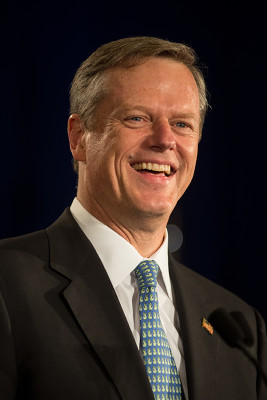
After a close gubernatorial race and his first year in office, Massachusetts Gov. Charlie Baker has focused on addressing widespread problems in his state.
Solutions to opioid addiction, transportation reform and government spending were among the issues Baker pursued since he took office in January.
With a 74 percent approval rating, Baker’s leadership resonates across the state, said Massachusetts GOP spokesman Terry MacCormack.
“No matter the issue, he’s really taking a common sense, results-oriented approach that the people of Massachusetts voted for last fall and that they’re really happy to see him delivering on,” he said
Despite his public approval, Massachusetts Democratic Party spokesman Patrick Beaudry said, Baker still needs to show concrete efforts for future investments.
“Governor Baker’s campaign contends that if you have a Republican rather than a Democrat in office, then you’ll create this competition, and this friction that will lead to a better state government,” he said. “The problem is, the only way to a better state government is by being willing to make smart, proactive investments in industries of the future.”
Resistance between a Republican Baker and a largely Democratic state government, however, is thought to be a successful strategy, MacCormack said.
“He really made an argument for the benefits of two-party government and constructive friction, which is the ability for both parties to sort of have a debate and start a conversation and produce policies that ultimately are going make everybody better off,” he said.
John Berg, a professor at Suffolk University, said that Baker’s style of governing does not reflect the contemporary stereotype of the Republican Party.
“He has clearly been a Republican who wants to govern the state and has done a good job with that,” he said. “If you look at the history of Massachusetts, [Baker] does talk like a traditional Republican, but not like the Republicans the country has seen recently.”
Kenneth Cosgrove, also a professor at Suffolk, added that Baker has provided equal attention to both the economy and Massachusetts residents.
“[The] way that he is visibly showing this is on the response to the opioid crisis where again he worked with the Democrats but did so by stressing treatment options and, in some cases, mandatory confinement of addicts for minimum periods of time,” Cosgrove wrote in an email.
Mark Steffen, spokesman for Baker, talked about how the governor focused on addressing the epidemic of opioid abuse across the state in 2015.
“It wasn’t something he initially ran on, but you can’t fit 20 people in a room in Massachusetts without someone most likely having a connection to this issue,” he said.
Using the example of the transportation crisis from last winter, Beaudry said Baker used crises to advance his political strategy.
“What he’s done an exceptional job of thus far has been drumming up a fabricated crisis in state government that he’s then been able to exploit to get some of his political victories that we’ve seen in the first year,” he said.
Baker’s Winter Resiliency Plan will provide money and regulation for the Massachusetts Bay Transportation Authority in the coming winter in order to avoid the chaos of the previous year, Steffen said.
Changes to the MBTA have not been the only governmental reforms the governor has pursued. Following the death of Bella Bond this summer, Baker proposed Department of Children Facilities reforms to include stronger supervision policies, The Daily Free Press reported Oct. 1.
Berg said Baker’s efforts to improve the DCF symbolize his overall progress.
“He’s just reached the point where he’s starting to own the problems,” he said. “He said we are going to fix the DCF, they’ve looked at it, and it’s pretty clear that you need better management but you also that you need more money.”
Baker has increased budget funding for DCF by $35.5 million, Steffen said.
Continuing these programs and initiatives, MacCormack said, are improvements for Massachusetts and will continue to satisfy residents’ needs.
“We know the people of Massachusetts are going to expect to see [reform] from him because that’s what he’s been delivering so far,” he said.
Now that Baker has made it through his first year in office, Beaudry said the public has a sense of what kind of leader he is.
“Next year, when he has to really own his budget and be responsible for it two years into his term now, people are going to see what he’s all about,” Beaudry. “It’s going to be about cutting programs and slowing down initiatives.”
While some residents said they are pleased with Baker’s work, others had issues with some of his recent decisions.
Peter Zak, 53, of Fenway, said he appreciates Baker’s extensive work with the MBTA.
“There have been some problems in Massachusetts recently that he has really tried to work on and I think he’s done pretty well,” he said. “I know he’s been trying to do a lot to fix the T so that’s good.”
Megan Waters, 32, of Brighton, said although she has been satisfied with Baker’s work, she has problems with how he has responded to the Syrian refugee crisis.
“[For] most of the year I was pretty pleased with Baker, I thought he was doing a really good job and I haven’t had any problems,” she said. “But I’m pretty displeased with his decision about Syrian immigrants. That was the first time I felt really upset about Baker.”
Mike Thompson, 42, of Allston, said he has been content with Baker’s work so far.
“Every time I check the newspaper he’s doing something new and interesting,” he said. “He really cares about improving Massachusetts and is working really, really hard to do that. I haven’t had any complaints so far.”
CORRECTION: A previous version of this article read that Patrick Beaudry of the Massachusetts Democratic Party said, “While [Baker’s] done an exceptional job thus far” instead of “What he’s done an exceptional job of this far has been drumming up a fabricated crisis.” The article has been updated to reflect this change.
Editor-in-Chief. Bostonian by way of Indiana. Excessive Instagrammer. Seltzer addict. Journalism junkie, storytelling fiend.




